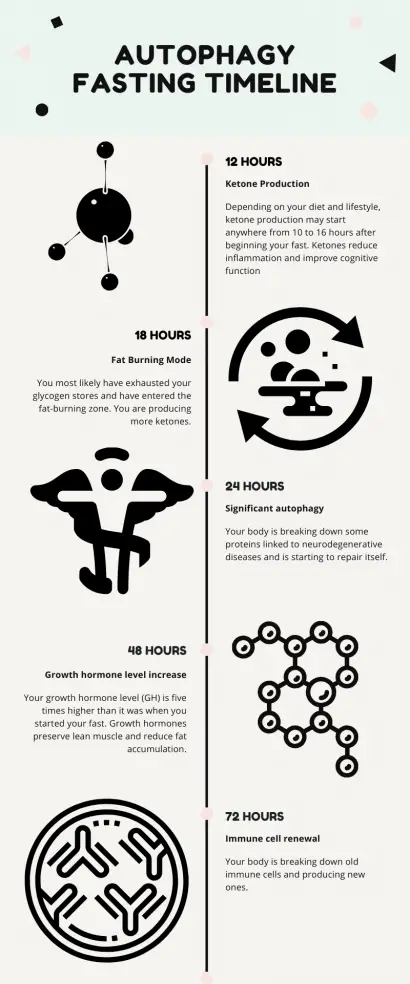We often say, “more isn’t always better,” which certainly applies to fasting. Fasting is a balancing act, especially for women. Let’s talk about how to determine how long is too long for fasting and how to make sure you are not fasting too much.
How Long Is Too Long for Fasting
How long is too long for fasting will depend on the person. I will give you a list of warning signs that you are fasting too much. Plus, if you experience some of these signs, I will give you some tips that may help you fast more safely.
Long-Term Fasting Vs. Intermittent Fasting
Before we get started with the warning signs that will help you determine how long is too long for fasting, I want to explain that intermittent fasting will not require you to fast for more than 36 hours at a time. However, if you go on a prolonged fast (more than 36 hours), you will likely have to be more cautious to avoid discomfort and health issues. I usually don’t recommend prolonged water fast, even though they are very beneficial. Instead, I recommend modified fasting. Modified fasting is based on the concepts of the Fasting Mimicking Diet, created by Dr. Valter Longo. It helps you achieve the benefits of prolonged water fasting without going on a water fast. That’s also why my 30-Day Intermittent Fasting Transformation begins with a modified fast. It ensures you get started on the right foot with the more advanced benefits of the autophagy timeline.

Autophagy Timeline
Why would anyone want to fast for 3, 5, or even 10 days? Because prolonged fasting creates deeper healing within your body. As you fast longer, the repair process intensifies. According to Dr. Mindy Pelzt, you receive maximum autophagy benefits at around 3 days into a water fast. Fortunately, Dr. Valter Longo found that modified fasting can afford, at the very least, as much autophagy as a water fast.

Warning Signs You Are Fasting Too Much
Ok! Now, let’s talk about warning signs that you should be aware of to determine how long is too long for fasting.
1. Poor Energy Levels
If you have poor energy levels, you need to pay attention. Intermittent fasting has helped me increase my energy level. You should notice you have more energy too! This comes from ketone production and improved insulin sensitivity. No more afternoon slumps! However, you need to readjust your fasting routine if you notice less energy. We will talk about that in the next section.
2. Hair Loss and Muscle Loss
Fasting is catabolic. The process of autophagy means your body is eating itself, which is good, right? However, the more you fast, the more your body will break down its own protein. This can result in hair loss and muscle loss. It can also result in stiffness and difficulty in recovering from your workouts.
Hormonal Changes and Nutritional Deficiencies
Another issue you may encounter that will result in hair loss and muscle loss is the lack of nutrients. It’s harder to ensure your body gets all the nutrients it needs as you tighten that eating window. Furthermore, it may cause hormonal changes. As your estrogen and progesterone levels drop, you may notice your hair doesn’t grow as fast or that you lose more hair. Some women may find fasting influences their reproductive hormones.
3. Weight Loss Plateau or Weight Gain
If you fast too long and too frequently, you may experience starvation mode, which is your body’s natural response to prolonged calorie restriction: the shorter your eating window, the greater chance you will sustain an important calorie deficit. If you do that long-term daily, you may find that your body learns to function on fewer calories. When this happens, you experience a weight loss plateau or may even gain weight.
Fasting and Leptin
Fasting decreases your leptin levels. Leptin communicates satiety to the brain. Overweight people typically have higher levels of leptin but are less sensitive to it. Meanwhile, lean people have lower leptin levels but are more leptin-sensitive. A lack of leptin can mean increased hunger, which may be why fasting sometimes could be counterproductive. However, keep in mind that fasting may also increase leptin and decreases hunger hormones such as neuropeptide-Y.
4. Mood Changes
Fasting can affect your mood negatively by affecting your reproductive hormones, as we talked about already. Fasting sometimes causes increased irritability and anxiety, but it may also result in an increased sense of achievement, reward, pride, and control.
5. Changes to Your Menstrual Cycles
If you experience menstrual changes, you must take a step back and re-evaluate your intermittent fasting method. I will give you some tips in the next section.
What to Do If You Are Noticing Signs You Are Fasting Too Much
Most of these tips will help us avoid all the warning signs that we went through. The most appropriate measure to try first will depend on your priorities and what you think is most likely to help. You know your body, and you probably know what the problem may be. Use my list to get you started thinking about your options. You can implement more than one tip at a time. Please give it a week or two. See if it helps.
Fast Sporadically Rather Than Every Day
As a general rule, I don’t recommend that you fast every day. I prefer a longer fasting window (usually 20 hours) done less frequently (3-5 times a week). It is also what I recommend in my 30-Day Intermittent Fasting Transformation program. This approach not only ensures you achieve ketosis on your fasting days but also helps avoid a sustained long-term calorie deprivation that would contribute to a slower metabolism.
A Word About Weight Loss Plateaus
I want to say a word about weight loss plateaus. I talk to many women who think they are not losing weight on a certain protocol because they are losing “only” 3 pounds a month. Or they think their weight loss approach is no longer working because they don’t lose weight in one month. It’s important to realize that healthy, sustainable weight loss takes time. Having a weight loss plateau is natural. It took me over a year to lose 20 lbs. Think about that! It’s less than 2 lbs a month! I did go a few months without losing any weight, and then, I would lose 4 lbs some months. You have to be patient. You are creating your new lifestyle, not going on a crash diet. Don’t make losing only 2 lbs this month an excuse to go back to the lifestyle that had you gain the weight in the first place! Please, don’t!
Make Sure Your Diet Focuses on Nutrient-Dense Foods
Fasting means that, generally, you will be eating less. You need to make sure that the foods you do eat are going to sustain your body and help you feel your best. I do allow myself treats a few times a week. I don’t always have a perfect diet. However, I love my salads and my whole foods. I prefer the taste of nutritious homemade foods to prepackaged foods. Plus, I like to break my fast with the Power Shake for an added boost of vitamins and minerals daily.

Please read my post What to Eat to Break a Fast, for more guidance on nutrient-dense foods.
Drink Plenty of Water
Ensure you drink at least one ounce of water per pound of body weight each day (around 74 ounces or 9 cups daily for women).
Increase Your Electrolytes
Some people add half a teaspoon of Himalayan or sea salt to a glass of water. I also love the Super Lytes because they include Organic Rooibos Extract, which provides a source of antioxidants and keeps you energized.
Cycle Carbs
Cycling everything is a good idea. Change things up by not fasting every day and switching up your macros. Maybe go keto for a week and then consume moderate carbs. Or go low carb for a few days and include more carbs in the next few days. You don’t need to be counting carbs and obsessing over it (unless you want to make sure you are keto for a while, in which case my free meal plan will help, but be conscious of limiting your carbs some days and indulge more other days.

Eat More Protein
Protein is the most satiating macronutrient. It is also essential to ensure you don’t lose muscle mass. Plus, it may help avoid hair loss. Make sure you consume at least 0.8 grams of protein per pound of body weight. You could also try a protein shake supplement or the Super Aminos to increase your protein consumption.

Warning Signs You Are Fasting Too Much Video
In Summary
Figuring how long is too long for fasting will require some experimenting. If you implement my suggestions, I am confident you will not suffer from fasting too much if all you do is intermittent fasting. It is unlikely that intermittent fasting, which always requires you to fast less than 36 hours, combined with proper nutrient and water intake, should cause health issues. However, if your symptoms don’t resolve after a few weeks or trying my tips, it’s a good idea to take a break and see how you feel.





